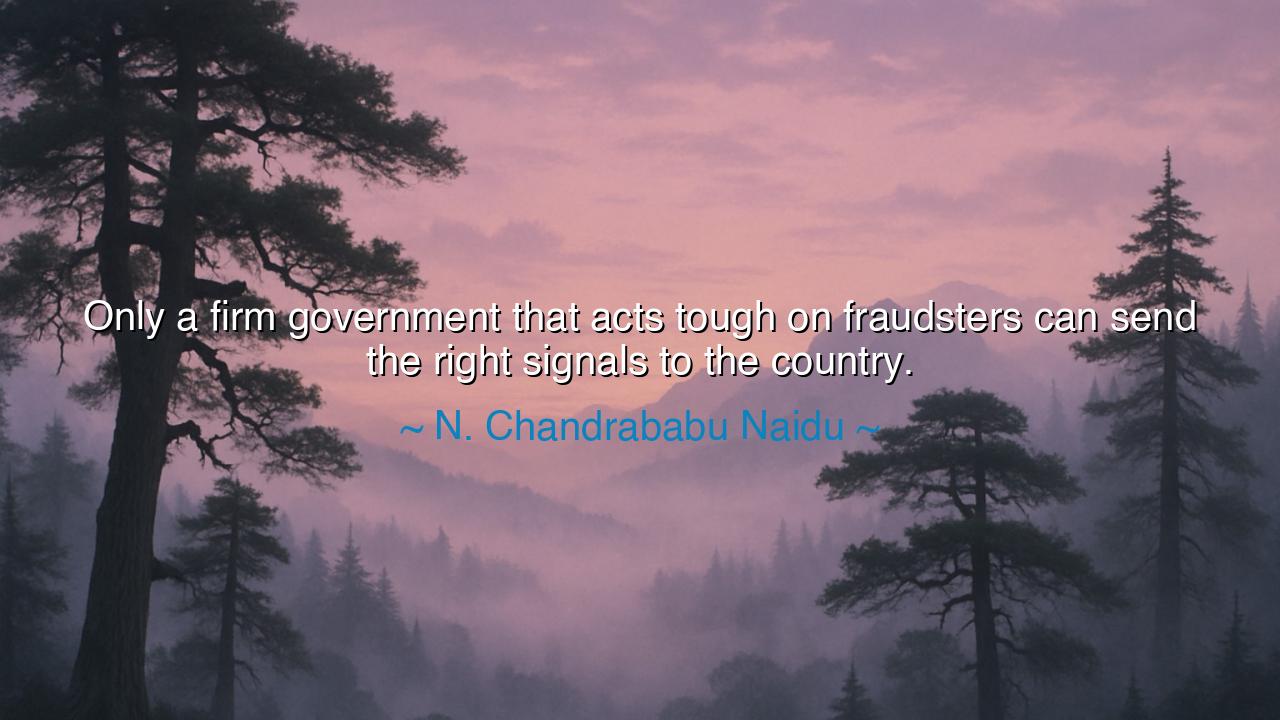
Only a firm government that acts tough on fraudsters can send the
Only a firm government that acts tough on fraudsters can send the right signals to the country.






Hearken, children of virtue and seekers of justice, and attend to the words of N. Chandrababu Naidu, who proclaimed with unflinching resolve: "Only a firm government that acts tough on fraudsters can send the right signals to the country." In this declaration lies a timeless truth about authority, integrity, and the moral responsibility of leadership. Naidu reminds us that governance is not merely the administration of laws, but the embodiment of justice, signaling to every citizen that wrongdoing will meet with consequence, and that society honors honesty and diligence above deception and greed.
The origin of Naidu’s insight emerges from observation of public administration and societal order. When fraudsters act without restraint, it erodes trust, undermines institutions, and weakens the moral fabric of the nation. A government that is decisive, vigilant, and uncompromising in confronting corruption communicates a powerful message: that integrity matters, that law is not empty, and that the actions of the few cannot imperil the common good. Naidu’s words echo the wisdom of ancient sages: justice must be both visible and forceful to sustain the society it protects.
Consider the imagery of sending signals to the country. Leadership acts as a beacon, guiding the conduct of citizens and institutions alike. A lenient or indecisive government emboldens the unscrupulous, allowing fraud to flourish, while a firm hand establishes boundaries, discourages vice, and reinforces moral norms. Through decisive action, a nation cultivates trust, confidence, and order, ensuring that lawlessness does not dictate the rhythm of public life.
History provides vivid exemplars. In ancient Rome, leaders such as Cato the Elder acted tirelessly against corruption in the Senate, the courts, and commerce, demonstrating that accountability was non-negotiable. His firmness instilled both fear and respect, shaping a civic culture where public trust was preserved and moral standards upheld. Similarly, in modern history, nations that confront financial crimes and political fraud decisively tend to experience stronger institutions, robust economies, and greater civic cohesion.
Naidu’s reflection is also a meditation on the balance of power and morality. Authority is not merely symbolic; it must enforce standards that safeguard society from exploitation. Fraud, unchecked, drains resources, diminishes opportunity, and corrodes faith in institutions. A government that acts with firmness demonstrates that ethics and governance are inseparable, and that leadership carries the sacred duty to uphold both law and principle.
The lesson is timeless: strength in governance communicates moral clarity and deters wrongdoing. Citizens observe not only what is lawful, but what is enforced. A firm government fosters an environment where honesty is rewarded, corruption is punished, and public trust is sustained. The moral and practical authority of the state is measured not only by statutes, but by the courage to implement them faithfully and visibly.
Practical actions emerge naturally: support transparency and accountability in governance; demand that leaders act decisively against fraud and corruption; cultivate ethical behavior in personal and professional spheres; and participate in civic life with awareness that integrity must be both upheld and defended. By doing so, citizens reinforce the signals of justice that a firm government communicates.
In sum, Naidu’s words illuminate a profound truth: justice, enforced with firmness, is both a shield and a guide. Leadership that acts boldly against fraudsters strengthens the moral and institutional foundation of the nation, ensuring that trust, order, and fairness prevail. Let this lesson guide rulers and citizens alike, reminding all that integrity is the bedrock upon which prosperity and harmony are built.
If you wish, I can craft an even more epic, mythic version, turning Naidu’s reflection into a heroic narrative about the struggle for justice, the vigilance of leadership, and the moral foundations of governance—perfect for immersive audio storytelling. Do you want me to do that?






AAdministratorAdministrator
Welcome, honored guests. Please leave a comment, we will respond soon